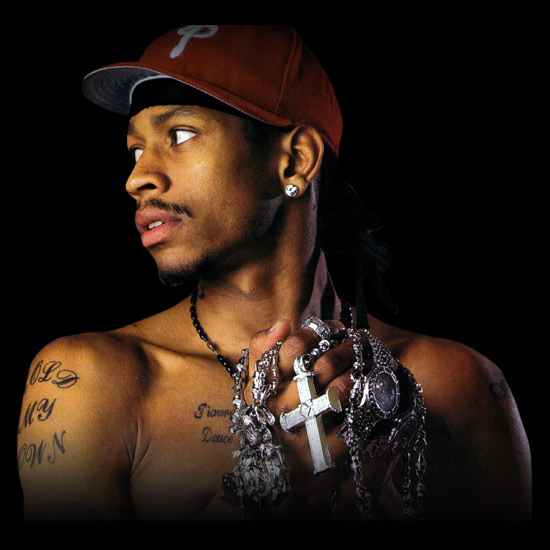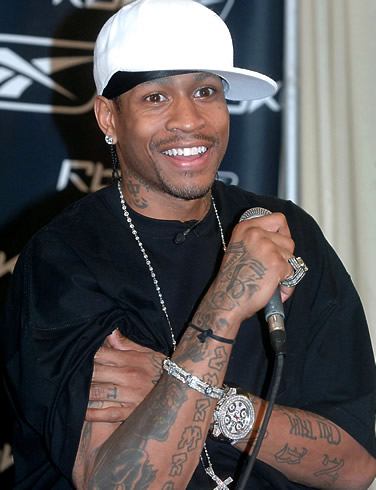Winning the NBA scoring title during the 1998–99, 2000–01, 2001–02 and 2004–05 seasons, Iverson was one of the most prolific scorers in NBA history, despite his small stature (listed at 6 feet, 0 inches). His regular season career scoring average of 26.7 points per game ranks sixth all-time, and his playoff career scoring average of 29.7 points per game is second only to Michael Jordan. Iverson was also the NBA Most Valuable Player of the 2000–01 season and led his team to the 2001 NBA Finals the same season. Iverson represented the United States at the 2004 Summer Olympics, winning the Bronze medal. He also played for the Denver Nuggets, Detroit Pistons and the Memphis Grizzlies, before returning to the 76ers for part of the 2009-10 season.
He was rated the 5th greatest NBA shooting guard of all time by ESPN in 2008.
Contents
* 1 Early life
* 2 College basketball
* 3 Professional career
o 3.1 Philadelphia 76ers
+ 3.1.1 First four seasons (1996–2000)
+ 3.1.2 MVP season and trip to the finals (2000–01)
+ 3.1.3 Relationship with Larry Brown
+ 3.1.4 Falling out with Sixers
o 3.2 Denver Nuggets
o 3.3 Detroit Pistons and Memphis Grizzlies
o 3.4 Return to the 76ers
o 3.5 Beşiktaş
* 4 International career
o 4.1 2004 Olympics
* 5 NBA career statistics
o 5.1 Regular season
o 5.2 Playoffs
* 6 Personal life
* 7 See also
* 8 Notes
* 9 External links
Early life
Allen Iverson was born to his single 15-year old mother, Ann Iverson, in Hampton, Virginia, and was given his mother's maiden name after his father Allen Broughton left her.
At Bethel High School, Iverson started as quarterback for the school football team, and started as point guard for the school basketball team. Allen was able to lead both teams to state championships.
On February 14, 1993, Iverson and several of his friends became involved in an altercation with a group of white teenagers at the Circle Lanes bowling alley in Hampton, Virginia. Allegedly, Iverson's crowd was raucous and had to be asked to quiet down several times, and eventually a shouting duel began with another group of youths. Shortly thereafter, a huge fight erupted, pitting the white crowd against the blacks. During the fight, Iverson allegedly struck a woman in the head with a chair. He, along with three of his friends who are also African-American, were the only people arrested. Iverson, who was 17 at the time, was convicted as an adult of the felony charge of maiming by mob, a rarely used Virginia statute that was designed to combat lynching.[6] Iverson and his supporters maintained his innocence, claiming that he left the alley as soon as the trouble began. Iverson said, "For me to be in a bowling alley where everybody in the whole place know who I am and be crackin' people upside the head with chairs and think nothin' gonna happen? That's crazy! And what kind of a man would I be to hit a girl in the head with a damn chair? I rather have 'em say I hit a man with a chair, not no damn woman."
Iverson drew a 15-year prison sentence, with 10 years suspended. After Iverson spent four months at Newport News City Farm, a correctional facility in Newport News, Virginia, he was granted clemency by Virginia Governor Douglas Wilder, and the Virginia Court of Appeals overturned the conviction in 1995 for insufficient evidence. This incident and its impact on the community is explored in the documentary film No Crossover: The Trial of Allen Iverson.
 allen iverson
allen iverson
 allen iverson
allen iverson
 allen iverson
allen iverson
 allen iverson
allen iverson
 allen iverson
allen iverson
 allen iverson
allen iverson
 allen iverson
allen iverson

allen iverson